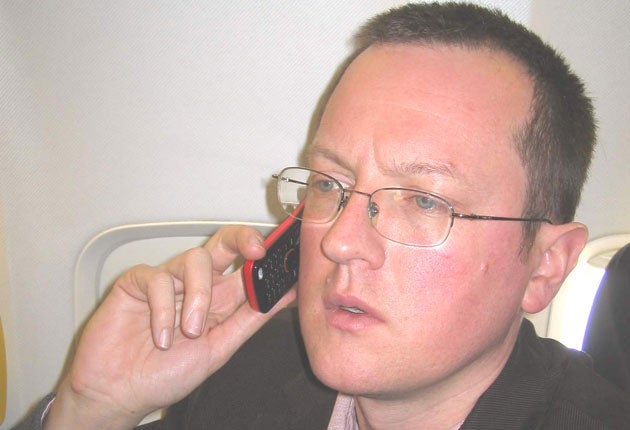On the plane that lets you dial at 30,000ft
Ryanair: Upwardly mobile – but at a price

Your support helps us to tell the story
From reproductive rights to climate change to Big Tech, The Independent is on the ground when the story is developing. Whether it's investigating the financials of Elon Musk's pro-Trump PAC or producing our latest documentary, 'The A Word', which shines a light on the American women fighting for reproductive rights, we know how important it is to parse out the facts from the messaging.
At such a critical moment in US history, we need reporters on the ground. Your donation allows us to keep sending journalists to speak to both sides of the story.
The Independent is trusted by Americans across the entire political spectrum. And unlike many other quality news outlets, we choose not to lock Americans out of our reporting and analysis with paywalls. We believe quality journalism should be available to everyone, paid for by those who can afford it.
Your support makes all the difference.In its illustrious history of reshaping air travel, Ryanair has totted up many firsts. It proudly introduced the £9.50 airport check-in fee, bravely pioneered the £3 cup of no-frills instant coffee and recently dreamt up the brilliant wheeze of charging £30 if your duty-free fails to fit in your hand luggage.
Shortly after 10am yesterday, flight FR113 from Gatwick to Dublin changed flying in Britain forever by unleashing on the unsuspecting air traveller another budget airline innovation. Precisely seven minutes after take-off, a green light on a newly-installed overhead cabin sign lit up, reading: "Mobile use permitted."
Rest assured, the steeply-priced snacks were still there, along with the £9.50 airport check-in fee, the £16 excess baggage levy and the eye-watering £142.50 charge to change a name on a ticket. But to this cornucopia of what Ryanair likes to call its "ancillary revenues" can now be added a new wallet-bashing in-flight experience – the £3 per minute mid-air phone call.
From this week, Ryanair's 67 million passengers will be able to use their mobile phones at 30,000ft, after the Irish airline installed cutting-edge technology that allows voice calls, text messages and emails to penetrate one of the few remaining modes of public transport that has hitherto been free from those conversations along the lines of: "Hello? Hello? I'm on the ... Hello? Hello? Yes, it's me, I've been delayed... Hello? Hello?"
However when The Independent sampled the system yesterday it functioned perfectly – if expensively – well on a flight that was running 15 minutes late. The mobile service, which only operates above an altitude of 10,000ft and cannot be used during take-off and landing, works by beaming the phone call to a satellite from an antenna fixed to the top of the jet which is then beamed back to earth to be relayed on the normal mobile phone networks. The cost to the passenger is £1.50 to £3 per minute, 40p per text and £1 to £2 for a limited quantity of emails.
So far, just 25 of Ryanair's 170-strong fleet has been fitted with the equipment (at an estimated cost of £500,000 per jet) and just one UK network, O2, is signed up. But the company says all its aircraft will be mobile-friendly within 18 months and insists other networks will join within weeks.
With his customary frankness, the company's flamboyant chief executive Michael O'Leary insisted that his airline was not profiteering from its passengers, saying that it only received "a small percentage" of the revenue from the call charges, which is shared between the mobile-phone companies and OnAir, the Swiss-based company that runs the service. With unusual coyness, the self-styled enfant terrible of his rival "legacy" airlines, nonetheless admitted he expected "sizeable" revenue from the phone service.
Dressed in a foam mobile phone fancy dress costume, Mr O'Leary also swatted aside concerns that the prospect of holidaymakers and business travellers shouting into their handsets in front of fellow travellers could lead to a new phenomenon of mobile air rage.
He said: "Anyone who thinks Ryanair flights are some sort of bastion of sanctity where you can contemplate your navel is wrong. We already bombard you with as many in-flight announcements and trolleys as we can... The more calls that are made, the cheaper they become.
"We don't force anyone to buy these things. They are optional extras." In reality, Ryanair is at the vanguard of what is likely to become a commonplace on passenger aircraft. British Airways will be introducing a similar service on its new business-class only flights from New York later this year while BMI, Air France and Portuguese airline TAP are also running trials. Emirates has already begun operating the service on some non-UK flights.
Douglas McNeill, a London-based aviation analyst with Blue Oar Securities, said: "Airlines are doing this as a way of realising extra revenue – for which they are desperate at the moment. It is also in response to consumer demand. People are using phones all the time and increasingly not being able to use them in the air is seen as an anomaly."
In an effort to maximise use of its high-altitude chit-chat facility, Ryanair has plastered its cabins with posters of doe-eyed blondes and smiling-yet-stern bosses with slogans such as "She's expecting your message" and "Tell him about your meeting".
Mr O'Leary said: "Customers will soon be able to call or text home from 30,000ft to tell loved ones of yet another on-time Ryanair flight." Or, presumably, one running 15 minutes late.
Join our commenting forum
Join thought-provoking conversations, follow other Independent readers and see their replies
Comments